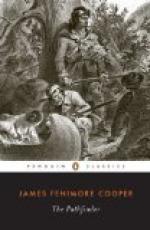“I understand you, Mabel; and God bless you for thinking of the welfare of men as humble as we are. We have our pleasures, it is true, as well as our gifts, but we might be happier; yes, I do think we might be happier.”
“Happier! in what way, Pathfinder? In this pure air, with these cool and shaded forests to wander through, this lovely lake to gaze at and sail upon, with clear consciences, and abundance for all their real wants, men ought to be nothing less than as perfectly happy as their infirmities will allow.”
“Every creatur’ has its gifts, Mabel, and men have theirs,” answered the guide, looking stealthily at his beautiful companion, whose cheeks had flushed and eyes brightened under the ardor of feelings excited by the novelty of her striking situation; “and all must obey them. Do you see yonder pigeon that is just alightin’ on the beach —here in a line with the fallen chestnut?”
“Certainly; it is the only thing stirring with life in it, besides ourselves, that is to be seen in this vast solitude.”
“Not so, Mabel, not so; Providence makes nothing that lives to live quite alone. Here is its mate, just rising on the wing; it has been feeding near the other beach, but it will not long be separated from its companion.”
“I understand you, Pathfinder,” returned Mabel, smiling sweetly, though as calmly as if the discourse was with her father. “But a hunter may find a mate, even in this wild region. The Indian girls are affectionate and true, I know; for such was the wife of Arrowhead, to a husband who oftener frowned than smiled.”
“That would never do, Mabel, and good would never come of it. Kind must cling to kind, and country to country, if one would find happiness. If, indeed, I could meet with one like you, who would consent to be a hunter’s wife, and who would not scorn my ignorance and rudeness, then, indeed, would all the toil of the past appear like the sporting of the young deer, and all the future like sunshine.”
“One like me! A girl of my years and indiscretion would hardly make a fit companion for the boldest scout and surest hunter on the lines.”
“Ah, Mabel! I fear me that I have been improving a red-skin’s gifts with a pale-face’s natur’? Such a character would insure a wife in an Indian village.”
“Surely, surely, Pathfinder, you would not think of choosing one so ignorant, so frivolous, so vain, and so inexperienced as I for your wife?” Mabel would have added, “and as young;” but an instinctive feeling of delicacy repressed the words.
“And why not, Mabel? If you are ignorant of frontier usages, you know more than all of us of pleasant anecdotes and town customs: as for frivolous, I know not what it means; but if it signifies beauty, ah’s me! I fear it is no fault in my eyes. Vain you are not, as is seen by the kind manner in which you listen to all my idle tales about scoutings and trails; and as for experience, that will come with years. Besides, Mabel, I fear men think little of these matters when they are about to take wives: I do.”




